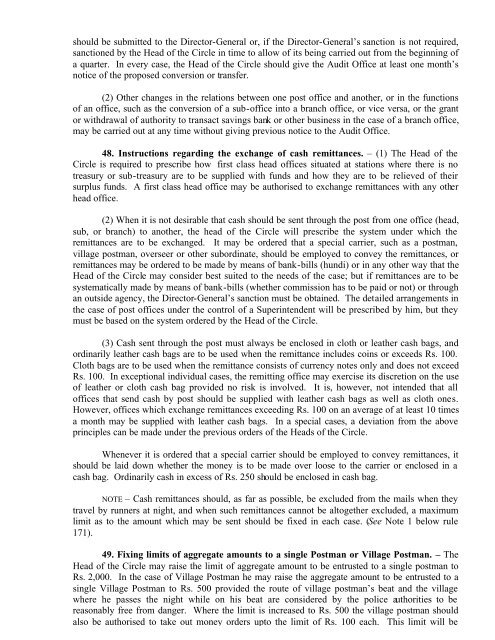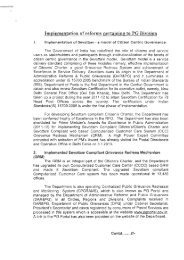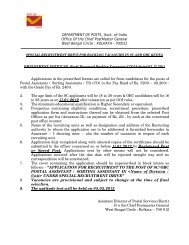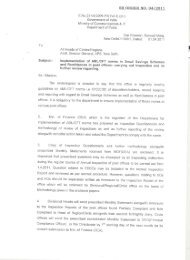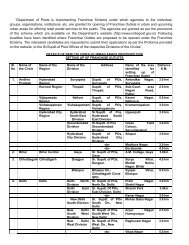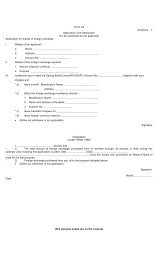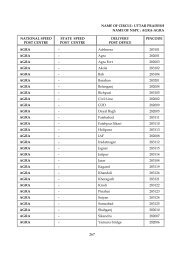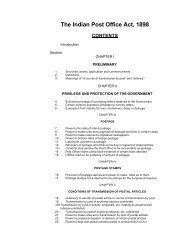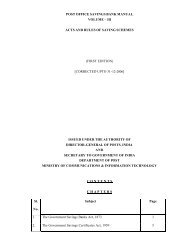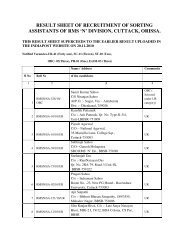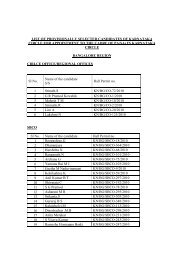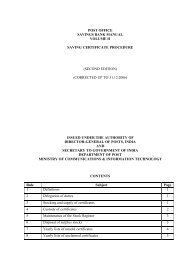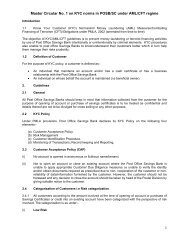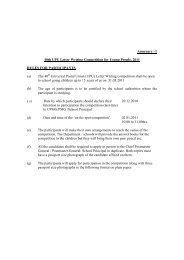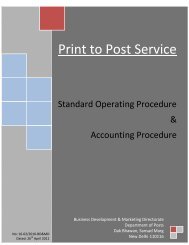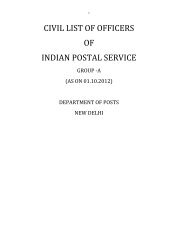Postal Manual Vol. VIII - India Post
Postal Manual Vol. VIII - India Post
Postal Manual Vol. VIII - India Post
You also want an ePaper? Increase the reach of your titles
YUMPU automatically turns print PDFs into web optimized ePapers that Google loves.
should be submitted to the Director-General or, if the Director-General’s sanction is not required,<br />
sanctioned by the Head of the Circle in time to allow of its being carried out from the beginning of<br />
a quarter. In every case, the Head of the Circle should give the Audit Office at least one month’s<br />
notice of the proposed conversion or transfer.<br />
(2) Other changes in the relations between one post office and another, or in the functions<br />
of an office, such as the conversion of a sub-office into a branch office, or vice versa, or the grant<br />
or withdrawal of authority to transact savings bank or other business in the case of a branch office,<br />
may be carried out at any time without giving previous notice to the Audit Office.<br />
48. Instructions regarding the exchange of cash remittances. – (1) The Head of the<br />
Circle is required to prescribe how first class head offices situated at stations where there is no<br />
treasury or sub-treasury are to be supplied with funds and how they are to be relieved of their<br />
surplus funds. A first class head office may be authorised to exchange remittances with any other<br />
head office.<br />
(2) When it is not desirable that cash should be sent through the post from one office (head,<br />
sub, or branch) to another, the head of the Circle will prescribe the system under which the<br />
remittances are to be exchanged. It may be ordered that a special carrier, such as a postman,<br />
village postman, overseer or other subordinate, should be employed to convey the remittances, or<br />
remittances may be ordered to be made by means of bank-bills (hundi) or in any other way that the<br />
Head of the Circle may consider best suited to the needs of the case; but if remittances are to be<br />
systematically made by means of bank-bills (whether commission has to be paid or not) or through<br />
an outside agency, the Director-General’s sanction must be obtained. The detailed arrangements in<br />
the case of post offices under the control of a Superintendent will be prescribed by him, but they<br />
must be based on the system ordered by the Head of the Circle.<br />
(3) Cash sent through the post must always be enclosed in cloth or leather cash bags, and<br />
ordinarily leather cash bags are to be used when the remittance includes coins or exceeds Rs. 100.<br />
Cloth bags are to be used when the remittance consists of currency notes only and does not exceed<br />
Rs. 100. In exceptional individual cases, the remitting office may exercise its discretion on the use<br />
of leather or cloth cash bag provided no risk is involved. It is, however, not intended that all<br />
offices that send cash by post should be supplied with leather cash bags as well as cloth ones.<br />
However, offices which exchange remittances exceeding Rs. 100 on an average of at least 10 times<br />
a month may be supplied with leather cash bags. In a special cases, a deviation from the above<br />
principles can be made under the previous orders of the Heads of the Circle.<br />
Whenever it is ordered that a special carrier should be employed to convey remittances, it<br />
should be laid down whether the money is to be made over loose to the carrier or enclosed in a<br />
cash bag. Ordinarily cash in excess of Rs. 250 should be enclosed in cash bag.<br />
NOTE – Cash remittances should, as far as possible, be excluded from the mails when they<br />
travel by runners at night, and when such remittances cannot be altogether excluded, a maximum<br />
limit as to the amount which may be sent should be fixed in each case. (See Note 1 below rule<br />
171).<br />
49. Fixing limits of aggregate amounts to a single <strong>Post</strong>man or Village <strong>Post</strong>man. – The<br />
Head of the Circle may raise the limit of aggregate amount to be entrusted to a single postman to<br />
Rs. 2,000. In the case of Village <strong>Post</strong>man he may raise the aggregate amount to be entrusted to a<br />
single Village <strong>Post</strong>man to Rs. 500 provided the route of village postman’s beat and the village<br />
where he passes the night while on his beat are considered by the police authorities to be<br />
reasonably free from danger. Where the limit is increased to Rs. 500 the village postman should<br />
also be authorised to take out money orders upto the limit of Rs. 100 each. This limit will be


